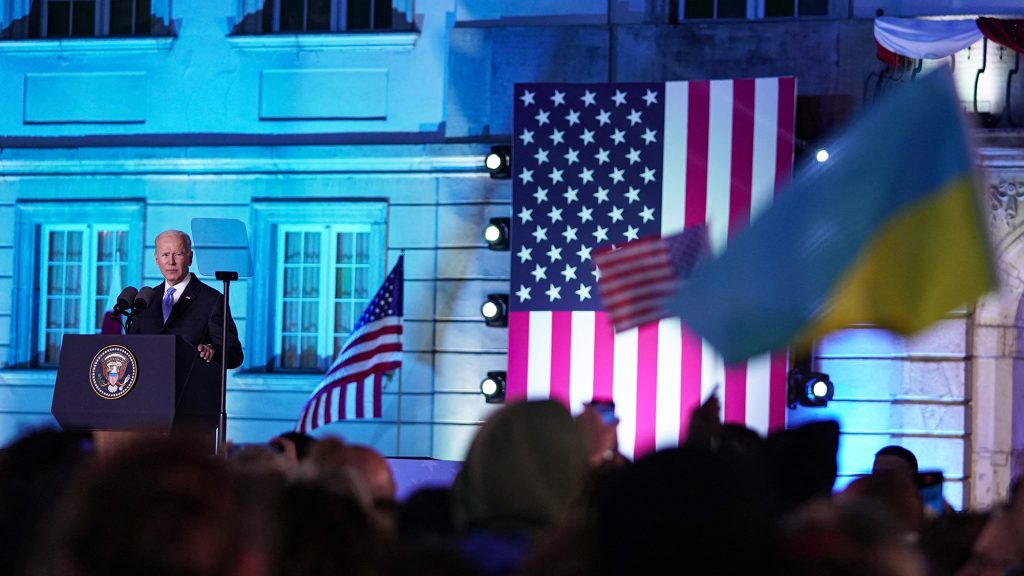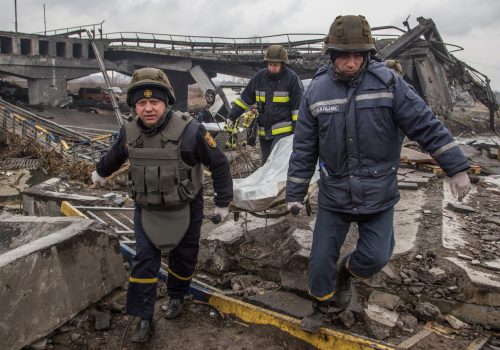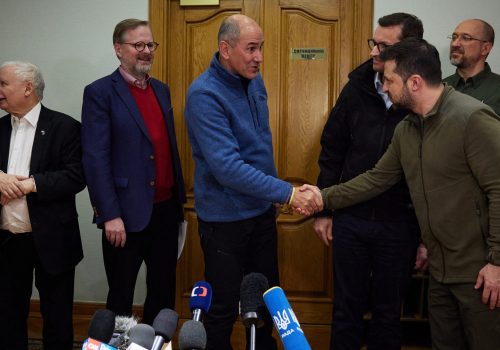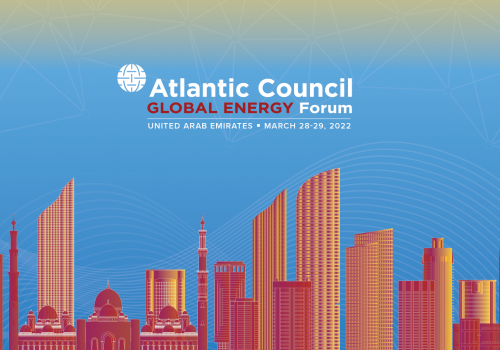“Are we ready for the new world order?”
The provocative title of the panel that led off the ambitiously named World Government Summit in Dubai last week was framed to suggest that a new global order is emerging—and the world is not ready for it.
There has been a proliferation of writing about who will shape the future world order since Russian President Vladimir Putin launched his invasion of Ukraine on February 24, the most murderous Europe has suffered since 1939.
The tempting conclusion: Should Ukraine survive as an independent, sovereign, and democratic country, the US- and Europe-backed forces will regain momentum against the previously ascendant Russian-Chinese forces of authoritarianism, oppression, and (at least in Putin’s case) evil.
That sounds like good news, but there is a downside.
“The Russian invasion of Ukraine and a series of COVID-related shutdowns in China do not, on the surface, appear to have much in common,” writes Atlantic Council fellow Michael Schuman in the Atlantic (a publication not related to the Council). “Yet both are accelerating a shift that is taking the world in a dangerous direction, splitting it into two spheres, one centered on Washington, DC, the other on Beijing.”
My conversations in Dubai—at the World Government Summit and at the Atlantic Council’s Global Energy Forum—show little enthusiasm or conviction for this bifurcated vision of the future. Middle Eastern participants have no interest in abandoning relations with China, the leading trading partner for Saudi Arabia and the United Arab Emirates (UAE), or breaking with Russia, which established itself as a force to be reckoned with when it saved Syrian President Bashar al-Assad through its military intervention in his war.
Beyond that, our Mideast partners have lost confidence in the United States’ commitment to or competence for global leadership following last year’s botched Afghanistan withdrawal. They are also experiencing whiplash from a Trump administration that trashed the nuclear deal with Iran and a Biden administration they feel is pursuing it without sufficiently factoring in Tehran’s regional aggression.
In all my many travels to the region over the years, I have never heard Mideast government officials express this level of frustration with US policymakers.
That said, they are watching Ukraine with fascination because a Ukrainian victory—with a strong, united West behind it—would force a rethink about US commitment and competence and shift the trajectory of declining transatlantic influence and relevance. Conversely, a Putin victory—even at a huge cost to Russians and Ukrainians alike—would accelerate Western decline as an effective global actor.
My own answer to the panel question on our preparedness for “the new world order” was to quote Henry Kissinger (who else?) in questioning the premise. “No truly global ‘world order’ has ever existed,” Kissinger wrote in his book World Order. “What passes for order in our time was devised in Western Europe nearly four centuries ago, at a peace conference in the German region of Westphalia, conducted without the involvement or even the awareness of most other continents or civilizations.” Over the following centuries, its influence spread.
With that as context, the question is not what the new world order would be, but rather if the United States and its allies can, through Ukraine, reverse the erosion of the past century’s gains as a first step toward establishing the first truly “global” world order.
Former US National Security Advisor Stephen Hadley told me the effort was the fourth attempt toward international order in the past century.
The first effort after World War I, through the Treaty of Versailles and the League of Nations, tragically failed. Instead, the world got European fascism, US isolationism, a global economic crisis, and millions dead from the Holocaust and World War II.
Following World War II, the United States and its partners were dramatically more successful, building what came to be called “the liberal international order” through the Marshall Plan and new multilateral institutions like the United Nations, the World Bank and International Monetary Fund, NATO, the European Coal and Steel Community (which formed the blueprint for the European Union), and others.
The third effort came following the West’s Cold War triumph. European democracies emerged or were restored, NATO was enlarged, the EU expanded, and it seemed for a time that the rules, practices, and institutions developed in the West after World War II and during the Cold War period could absorb and steer an expanded international order. China profited from and embraced this order for a time.
What has been eroding now for some years is US leaders’ commitment to defend, uphold, and advance that expanded international order—what Kissinger called “an inexorably expanding cooperative order of states observing common rules and norms, embracing liberal economic systems, forswearing territorial conquest, respecting national sovereignty, and adopting participatory and democratic systems of governance.”
US foreign-policy leadership has rarely been consistent, but it was remarkably so after World War II and through the end of the Cold War. Since then, the inconsistencies have grown, underscored by former President Barack Obama’s “leading from behind” strategy and former President Donald Trump’s “America First” vision.
Both, in their own ways, were a retreat from former President Harry Truman and the post-World War II architecture and US global leadership he established and embraced.
In the Mideast, countries like Saudi Arabia and the UAE that were once our closest allies now are hedging their bets. Beyond the Iran disagreements, Trump’s failure to accept his own electoral defeat raises doubts among our friends about the durability of the American political system and the consistency of US foreign policy.
Beyond that, our Mideast friends resent the Biden administration’s characterization of the emerging global contest as one pitting democracy versus authoritarianism.
“Every democratic attempt in the Arab world has turned ideological or tribal, so I’m not sure it is something we can work out successfully,” Anwar Gargash, diplomatic adviser to the UAE president, told the World Government Summit. He sees the issues between democracy and authoritarianism as not binary, but ones of governance and the solution being “something in the middle of both.”
US President Joe Biden’s decision to release on Thursday an “unprecedented” 180 million barrels of oil from the US Strategic Petroleum Reserve was an acknowledgment that the United States’ traditional oil-producing partners were not prepared to help him. The decision came hours after the Organization of the Petroleum Exporting Countries ignored calls from Western politicians to pump oil more quickly—and resisted any suggestion they should remove Russia from the organization.
Meanwhile, Russian Foreign Minister Sergei Lavrov visited New Delhi this week to thank India for its refusal to join sanctions against Russia, an approach shared by Brazil, Mexico, Israel, and the UAE. Said Lavrov, “We will be ready to supply to India any goods which India wants to buy.”
To shape the future world order, the United States and Europe first need to reverse the trajectory of Western and democratic decline in Ukraine.
The rest will need to follow.
This article originally appeared on CNBC.com
Frederick Kempe is president and chief executive officer of the Atlantic Council. You can follow him on Twitter @FredKempe.
THE WEEK’S TOP READS
#1 Vladimir Putin’s 20-Year March to War in Ukraine—and How the West Mishandled It
Michael R. Gordon, Bojan Pancevski, Noemie Bisserbe, and Marcus Walker | WALL STREET JOURNAL
This week’s must-read is the richly reported, elegantly written cover story of the WSJ Weekend Review section. It recounts the many ways that the West has mishandled the Putin challenge over the past twenty years.
“A look back at the history of the Russian-Western tensions,” write the authors, “based on interviews with more than thirty past and present policy makers in the US, EU, Ukraine, and Russia, shows how Western security policies angered Moscow without deterring it. It also shows how Mr. Putin consistently viewed Ukraine as existential for his project of restoring Russian greatness. The biggest question thrown up by this history is why the West failed to see the danger earlier.” Read more →
#2 There Is No Liberal World Order
Anne Applebaum | ATLANTIC
Anne Applebaum writes that the liberal world order will be lost if no one steps in to defend it.
Applebaum opens with an anecdote about the president of Estonia warning of Russian revanchism in 1994—a speech that caused a then-unknown deputy mayor of St. Petersburg named Vladimir Putin to storm out of the hall.
Later, Applebaum offers a series of actions that liberal democracies can take to strengthen their hand. Perhaps the most important is this: “Take democracy seriously. Teach it, debate it, improve it, defend it. Maybe there is no natural liberal world order, but there are liberal societies, open and free countries that offer a better chance for people to live useful lives than closed dictatorships do.” Read more →
#3 A general’s retirement is a chance to reflect on America’s standing in the Middle East
David Ignatius | WASHINGTON POST
David Ignatius’s reflections on the Middle East are always worth reading.
In this column, he interviews outgoing Marine General Frank McKenzie, who has long been “among the Pentagon’s hawks on Iran, and he carried out the order to kill Iranian Quds Force leader Qasem Soleimani in January 2020. But he told [Ignatius] last week that as he hands over military responsibility for the region, he’s convinced that ‘we need to find an accommodation with Iran going forward.’”
Ignatius continues, “Tehran’s centrality is likely to increase even more as the Biden administration moves toward a renewal of the Iran nuclear agreement soon.”
“The honest answer,” Ignatius writes, “is that the United States has been treading water much of the time, trying to maintain a status quo that was inherently unstable.” Read more →
#4 America and Saudi Arabia Are Stuck With Each Other
Yasmine Farouk and Andrew Leber | FOREIGN AFFAIRS
Amid the reshaping of the Middle East, the US-Saudi Arabia relationship has never looked more troubled. Yasmine Farouk and Andrew Leber suggest ways the United States can maintain its leverage in a relationship that has been the lynchpin of US strategy in the Middle East for decades.
“The United States,” they warn, “cannot take Saudi Arabia’s support for granted. Successive American administrations have underestimated the impact of post-9/11 US policies in the Middle East on their standing in Riyadh. Consider the US invasion of Iraq in 2003, the United States’ presumed role in the 2010-11 Arab revolts, the Iran nuclear deal, and Washington’s non-response to Iranian-backed attacks on Saudi oil infrastructure—memories of those events are the key reference points for today’s Saudi decision-makers.”
For now, they write, “Instead of just increasing weapon supplies to the kingdom, the Biden administration can chart a new path for the relationship by finding ways to leverage the kingdom’s status anxieties to secure policy concessions and determining mutually agreeable compensation for any economic and strategic losses to the kingdom if it agrees to increase production. Or they can continue on their present path, with the United States’ agency to reshape the bilateral relationship declining by the month.” Read more →
#5 Nixon’s Example of Sanity in Washington
Peggy Noonan | WALL STREET JOURNAL
Regular readers of “Inflection Points” know Peggy Noonan is one of my favorite columnists. Her look this week at Richard Nixon’s crucial defense of US democracy following his 1960 presidential election defeat is a timely reminder of just how reckless Trump is being.
“Nixon believed the election was stolen,” writes Noonan. “President Dwight D. Eisenhower and Senate Minority Leader Everett Dirksen wanted him to challenge the results. Nixon thought it could take months and might not succeed, but his thoughts went deeper than that. In the Cold War, the nuclear age, unity at home and abroad was needed. Young democracies looked up to us. If they thought our elections could be stolen it would hurt the world’s morale.”
Noonan ends with a reflection on how Nixon presided over the certification of his opponent’s election in 1961. “History went on and took its turns,” she notes. “Nixon came back and won the presidency in 1968. But when you read all this you wonder: Why can’t self-professed patriots love America like that now—maturely, protectively?” Read more →
Atlantic Council top reads
Image: US President Joe Biden holds a briefing outside the Royal Palace, Warsaw, Poland, March 26, 2022. Photo by Anna Voitenko/Ukrinform/ABACAPRESS.COM via Reuters.



